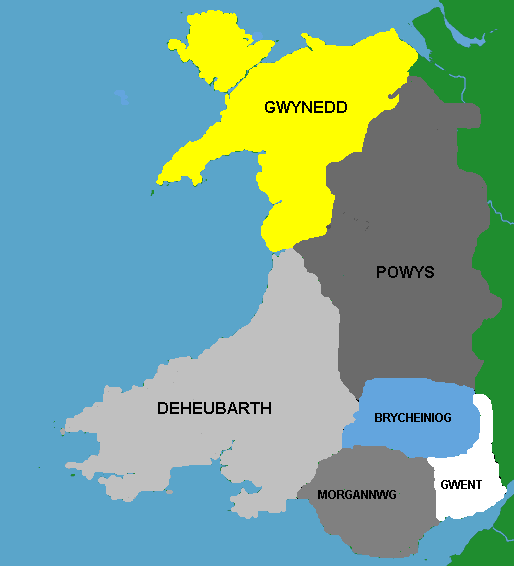Glywys on:
[Wikipedia]
[Google]
[Amazon]
 Glywys is a legendary early 5th century Welsh king, an important character in early Welsh genealogies as the eponymous founder king of
Glywys is a legendary early 5th century Welsh king, an important character in early Welsh genealogies as the eponymous founder king of
Glywysing
Glywysing was, from the sub-Roman period to the Early Middle Ages, a petty kingdom in south-east Wales. Its people were descended from the Iron Age tribe of the Silures, and frequently in union with Gwent, merging to form Morgannwg.
Name ...
, a southeast Welsh kingdom whose heartland lay between the Tawe and the Usk.
In one genealogy Glywys is reckoned the eldest son of Solor, son of Mor. He is said to have married Gwawl, the daughter of Ceredig of Ceredigion: one legend states they had twenty two children, all male bar one, including the churchmen Pedrog and Edelig. According to twelfth century sources, after the death of Glywys the kingdom was divided into three cantrefi
A cantref ( ; ; plural cantrefi or cantrefs; also rendered as ''cantred'') was a Wales in the Early Middle Ages, medieval Welsh land division, particularly important in the administration of Welsh law.
Description
Land in medieval Wales was divid ...
, Gwynllwg, Penychen
Penychen was a possible minor kingdom of early medieval Wales and later a cantref of the Kingdom of Morgannwg. Penychen was one of three cantrefi that made up the kingdom of Glywysing, lying between the rivers Taff and Thaw, the other two being ...
and Gorfynydd
Glywysing was, from the Sub-Roman Britain, sub-Roman period to the Early Middle Ages, a petty kingdom in south-east Wales in the Early Middle Ages, Wales. Its people were descended from the Iron Age tribes in Britain, Iron Age tribe of the Silu ...
, by his sons Gwynllyw father of Cadoc, Pawl and Merchwyn respectively, though Glwysing still existed and would later become Glamorgan
Glamorgan (), or sometimes Glamorganshire ( or ), was Historic counties of Wales, one of the thirteen counties of Wales that existed from 1536 until their abolishment in 1974. It is located in the South Wales, south of Wales. Originally an ea ...
. Gwynllyw gave his name to Newport Cathedral and also to Wentlooge.
Glywys' name may be a back-formation from the name of the kingdom and Glywysing's name may continue that of the Romano-British *Glevenses, the territory and citizens of '' Glevum'', or Gloucester. Such invented founding kings are not uncommon in British genealogy. "Gloucester" (''Glowancestre'', 1282) derives from the Old English
Old English ( or , or ), or Anglo-Saxon, is the earliest recorded form of the English language, spoken in England and southern and eastern Scotland in the Early Middle Ages. It developed from the languages brought to Great Britain by Anglo-S ...
''ceaster'', "fort", preceded by the Roman stem Glev- (pronounced glaiw). In Old Welsh
Old Welsh () is the stage of the Welsh language from about 800 AD until the early 12th century when it developed into Middle Welsh.Koch, p. 1757. The preceding period, from the time Welsh became distinct from Common Brittonic around 550, ha ...
, the city was known as ''Caerloyw'', ''caer'' = castle, and ''loyw'' from ''gloyw'' = glowing/bright. Hence Gloucester has been given a similar founder, Gloyw: genealogies of Vortigern
Vortigern (; , ; ; ; Old Breton: ''Gurdiern'', ''Gurthiern''; ; , , , etc.), also spelled Vortiger, Vortigan, Voertigern and Vortigen, was a 5th-century warlord in Sub-Roman Britain, Britain, known perhaps as a king of the Britons or at least ...
make him a descendant of Gloyw through his father Vitalus and his grandfather Vitalinus, while a lineage in the '' Bonedd y Saint'' makes saint Mechyll fab Echwys the grandson of Gwyn Glohoyw and the great-grandson of Gloyw Wallt-Lydan. In the Mabinogi, similarly, Pryderi marries Cigfa, "daughter of Gwyn Glohoyw, son of Gloyw Wallt-Lydan, son of Casnar Wledig".
Nevertheless Glywys is believed to have become a hermit in his later life and travelled to Cornwall
Cornwall (; or ) is a Ceremonial counties of England, ceremonial county in South West England. It is also one of the Celtic nations and the homeland of the Cornish people. The county is bordered by the Atlantic Ocean to the north and west, ...
where he founded the church of St Gluvias near Penryn. He is sometimes referred to as the Cornish Glywys, ''Glywys Cernyw''.
He is venerated as a saint and his feast day is 3 May
References
{{DEFAULTSORT:Glywys 415 births 5th-century Welsh monarchs 5th-century Christian saints Welsh royal saints Monarchs of Glywysing Monarchs of Morgannwg Year of death unknown